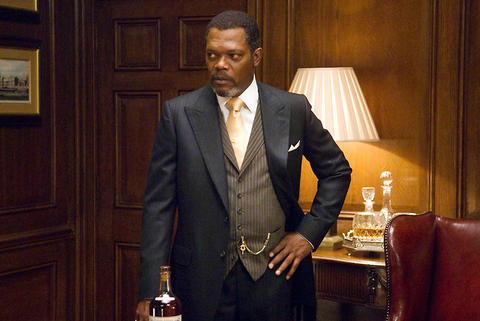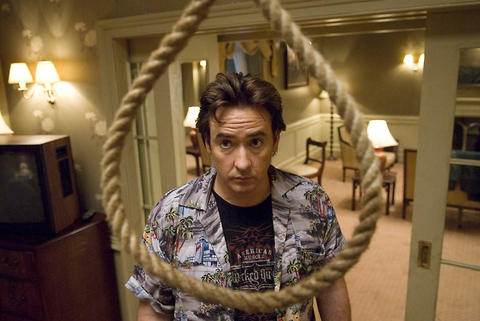A troubled writer, a haunted hotel room - who else but Stephen King? In 1408, adapted from a 2002 short story by King, John Cusack is the hack who drags his emotional baggage to Room 1408 of the Dolphin Hotel in Manhattan, accommodations whose history of grisly deaths demands investigation. Once there, he learns that checking out might not be an option.
Directed by Mikael Hafstrom with old-fashioned restraint and a stylish use of intense close-ups, 1408 is more psychological thriller than outright horror. Recycling many of King's familiar motifs, the story traps its protagonist in an apparitional loop filled with repeating signs of occult infestation: a Carpenters song bursting from a bedside radio, paintings that tilt and transform. The movie is most effective in its early scenes of prickly menace, and while the Dolphin is no Overlook (the haunted hotel in The Shining), its old-world creepiness is exactly right.
King is a writer who excels at finding malevolence in the mundane, and consequently his tortured Everymen have often been more successful on the small screen than on the large. Cusack's character descends directly from David Soul's in Salem's Lot: scarred heroes who have lost their faith. In Cusack's case, it's waiting for him behind the door of 1408.

PHOTOS: COURTESY OF CMC


The primaries for this year’s nine-in-one local elections in November began early in this election cycle, starting last autumn. The local press has been full of tales of intrigue, betrayal, infighting and drama going back to the summer of 2024. This is not widely covered in the English-language press, and the nine-in-one elections are not well understood. The nine-in-one elections refer to the nine levels of local governments that go to the ballot, from the neighborhood and village borough chief level on up to the city mayor and county commissioner level. The main focus is on the 22 special municipality

The People’s Republic of China (PRC) invaded Vietnam in 1979, following a year of increasingly tense relations between the two states. Beijing viewed Vietnam’s close relations with Soviet Russia as a threat. One of the pretexts it used was the alleged mistreatment of the ethnic Chinese in Vietnam. Tension between the ethnic Chinese and governments in Vietnam had been ongoing for decades. The French used to play off the Vietnamese against the Chinese as a divide-and-rule strategy. The Saigon government in 1956 compelled all Vietnam-born Chinese to adopt Vietnamese citizenship. It also banned them from 11 trades they had previously

Jan. 12 to Jan. 18 At the start of an Indigenous heritage tour of Beitou District (北投) in Taipei, I was handed a sheet of paper titled Ritual Song for the Various Peoples of Tamsui (淡水各社祭祀歌). The lyrics were in Chinese with no literal meaning, accompanied by romanized pronunciation that sounded closer to Hoklo (commonly known as Taiwanese) than any Indigenous language. The translation explained that the song offered food and drink to one’s ancestors and wished for a bountiful harvest and deer hunting season. The program moved through sites related to the Ketagalan, a collective term for the

As devices from toys to cars get smarter, gadget makers are grappling with a shortage of memory needed for them to work. Dwindling supplies and soaring costs of Dynamic Random Access Memory (DRAM) that provides space for computers, smartphones and game consoles to run applications or multitask was a hot topic behind the scenes at the annual gadget extravaganza in Las Vegas. Once cheap and plentiful, DRAM — along with memory chips to simply store data — are in short supply because of the demand spikes from AI in everything from data centers to wearable devices. Samsung Electronics last week put out word